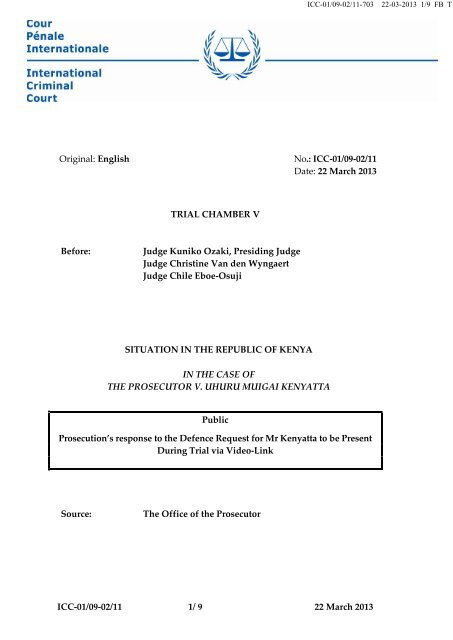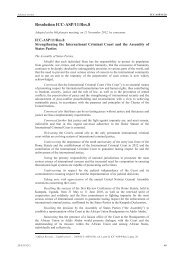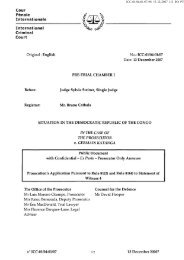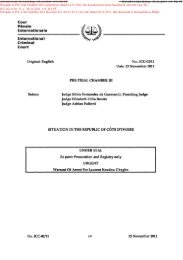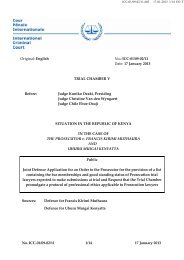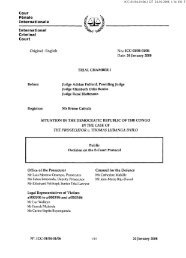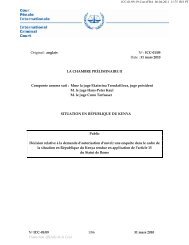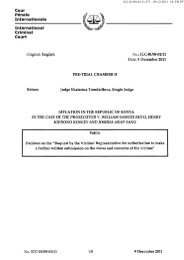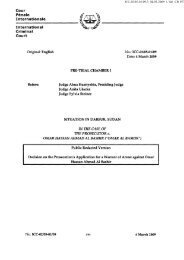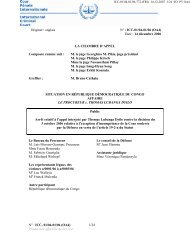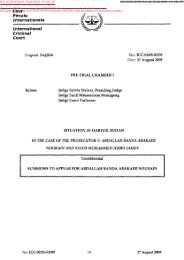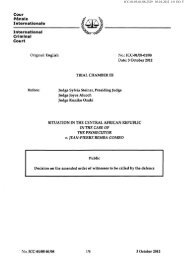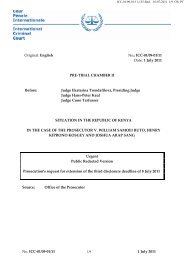ICC-01/09-02/11 1/ 9 22 March 2013 F Original: English No.: ICC-01 ...
ICC-01/09-02/11 1/ 9 22 March 2013 F Original: English No.: ICC-01 ...
ICC-01/09-02/11 1/ 9 22 March 2013 F Original: English No.: ICC-01 ...
Create successful ePaper yourself
Turn your PDF publications into a flip-book with our unique Google optimized e-Paper software.
<strong>ICC</strong>-<strong>01</strong>/<strong>09</strong>-<strong>02</strong>/<strong>11</strong>-703 <strong>22</strong>-03-2<strong>01</strong>3 1/9 FB T<br />
F<br />
<strong>Original</strong>: <strong>English</strong><br />
<strong>No</strong>.: <strong>ICC</strong>-<strong>01</strong>/<strong>09</strong>-<strong>02</strong>/<strong>11</strong><br />
Date: <strong>22</strong> <strong>March</strong> 2<strong>01</strong>3<br />
TRIAL CHAMBER V<br />
Before:<br />
Judge Kuniko Ozaki, Presiding Judge<br />
Judge Christine Van den Wyngaert<br />
Judge Chile Eboe-Osuji<br />
SITUATION IN THE REPUBLIC OF KENYA<br />
IN THE CASE OF<br />
THE PROSECUTOR V. UHURU MUIGAI KENYATTA<br />
Public<br />
Prosecution’s response to the Defence Request for Mr Kenyatta to be Present<br />
During Trial via Video-Link<br />
Source:<br />
The Office of the Prosecutor<br />
<strong>ICC</strong>-<strong>01</strong>/<strong>09</strong>-<strong>02</strong>/<strong>11</strong> 1/ 9 <strong>22</strong> <strong>March</strong> 2<strong>01</strong>3
<strong>ICC</strong>-<strong>01</strong>/<strong>09</strong>-<strong>02</strong>/<strong>11</strong>-703 <strong>22</strong>-03-2<strong>01</strong>3 2/9 FB T<br />
Document to be notified in accordance with regulation 31 of the Regulations<br />
of the Court to:<br />
The Office of the Prosecutor<br />
Fatou Bensouda<br />
Adesola Adeboyejo<br />
Counsel for Uhuru Muigai Kenyatta<br />
Steven Kay QC and Gillian Higgins<br />
Legal Representatives of Victims<br />
Fergal Gaynor<br />
Legal Representatives of Applicants<br />
Unrepresented Victims<br />
Unrepresented Applicants for<br />
Participation/Reparation<br />
The Office of Public Counsel for<br />
Victims<br />
Paolina Massidda<br />
States Representatives<br />
The Office of Public Counsel for the<br />
Defence<br />
Amicus Curiae<br />
REGISTRY<br />
Registrar<br />
Silvana Arbia<br />
Didier Preira, Deputy Registrar<br />
Victims and Witnesses Unit<br />
Maria Luisa Martinod-Jacome<br />
Victims Participation and Reparations<br />
Section<br />
Defence Support Section<br />
Detention Section<br />
Other<br />
<strong>ICC</strong>-<strong>01</strong>/<strong>09</strong>-<strong>02</strong>/<strong>11</strong> 2/ 9 <strong>22</strong> <strong>March</strong> 2<strong>01</strong>3
<strong>ICC</strong>-<strong>01</strong>/<strong>09</strong>-<strong>02</strong>/<strong>11</strong>-703 <strong>22</strong>-03-2<strong>01</strong>3 3/9 FB T<br />
Introduction<br />
1. The Defence application to Trial Chamber V (the Chamber) requesting that<br />
the accused be authorized to attend the trial via video link 1 (the Request)<br />
lacks any legal basis and should be rejected. The Rome Statute (Statute) is<br />
clear: an accused is required to be physically present at trial. The Request<br />
should also be denied because: (i) the Defence advances no cogent reasons<br />
why it would be appropriate to permit the Accused’s attendance at trial by<br />
video-link; (ii) it<br />
is against the interests of justice; and (iii) the Cou rt’s<br />
technology is currently inadequate to ensure meaningful attendance.<br />
Submissions<br />
I. <strong>No</strong> legal basis in the Court’s regulatory structure<br />
a. The Statute and the Rules of Procedure and Evidence (Rules) require the<br />
Accused’s physical presence in the Courtroom<br />
2. The Request can be disposed of on the basis of the plain language of Article<br />
63(1) of the Statute, which provides that “[t]he accused shall be present<br />
during the trial” (emphasis added).<br />
3. The only instance provided by the Statute where the accused can observe<br />
the trial via video-link from outside the Courtroom is in case of disruption<br />
as provided for by Article 63(2). 2<br />
This demonstrates that, although the<br />
drafters of the Statute were well aware of the capabilities of video-link<br />
1<br />
<strong>ICC</strong>-<strong>01</strong>/<strong>09</strong>-<strong>02</strong>/<strong>11</strong>-667.<br />
2<br />
Article 63 (2) of the Statute provides that “[i]f the accused, being present before the Court,<br />
continues to disrupt the trial, the Trial Chamber may remove the accused and shall make<br />
provision for him or her to observe the trial and instruct counsel from outside the courtroom,<br />
through the use of communications technology, if required. Such measures shall be taken only<br />
in exceptional circumstances after other reasonable alternatives have proved inadequate, and<br />
only for such duration as is strictly required”.<br />
<strong>ICC</strong>-<strong>01</strong>/<strong>09</strong>-<strong>02</strong>/<strong>11</strong> 3/ 9 <strong>22</strong> <strong>March</strong> 2<strong>01</strong>3
<strong>ICC</strong>-<strong>01</strong>/<strong>09</strong>-<strong>02</strong>/<strong>11</strong>-703 <strong>22</strong>-03-2<strong>01</strong>3 4/9 FB T<br />
technology, they did not intend for an accused to be permitted to be<br />
“present” at trial by means of video-link.<br />
4. Article 63(2) further confirms that the term “present” in Article 63(1) means<br />
physically present, referring, as it does, to the possibility of an “accused,<br />
being present before the Court” having to be “remove[d]” and taken outside<br />
“the courtroom” (emphasis added). Moreover, in the exceptional instance<br />
envisaged in Article 63(2), the accused’s “presence” by way of video-link is<br />
limited for such duration as is “strictly required”, which confirms the<br />
drafters’ intention that the accused should be physically present in court<br />
during his trial unless such presence renders the proceedings unworkable.<br />
5. The obligation of the Accused to be present at trial is also clear from other<br />
provisions in the Statute and the Rules.<br />
6. First, whereas Article 61(2)(a) permits a charged person to waive his/her<br />
right to be present at a confirmation hearing before the Pre-Trial Chamber,<br />
there is no such provision with respect to trial. Had the drafters intended for<br />
an accused to be able to waive his/her right to be present at the trial, they<br />
would have included such provision, as they did for the confirmation<br />
hearing.<br />
7. Second, Rule 124(3) provides that if a charged person has waived his right to<br />
be present at the confirmation hearing, “[t]he Pre-Trial Chamber may<br />
authorise the person to observe the hearing from outside the courtroom<br />
through the use of communication technology, if required”. The link<br />
between waiving presence and the ability to observe by communication<br />
technology confirms that the drafters equated “presence” to mean physical<br />
presence. The fact that no such right to waive presence, while watching<br />
from afar, exists at the trial stage confirms that the drafters chose not to<br />
<strong>ICC</strong>-<strong>01</strong>/<strong>09</strong>-<strong>02</strong>/<strong>11</strong> 4/ 9 <strong>22</strong> <strong>March</strong> 2<strong>01</strong>3
<strong>ICC</strong>-<strong>01</strong>/<strong>09</strong>-<strong>02</strong>/<strong>11</strong>-703 <strong>22</strong>-03-2<strong>01</strong>3 5/9 FB T<br />
create an option for an accused to be “present” via “communication<br />
technology”.<br />
8. Third, while Articles 68 and 69 and Rule 67 provide a mechanism for<br />
witnesses to testify by means of a video-link, there is no such option with<br />
respect to the presence of the Accused at trial. This further shows that the<br />
drafters of the Statute did not intend for the accused to observe the trial by<br />
means of a video-link.<br />
9. Fourth, the requirement for an accused to be physically present at trial was<br />
recently confirmed by Trial Chamber IV in Banda and Jerbo, which stated,<br />
when ruling on the conditions of summonses to appear, that:<br />
“[F]or purposes of their attendance in person at trial pursuant to Article 63 (1) of the<br />
Statute… the Chamber considers and hereby orders that the accused persons shall<br />
continue to be bound by summonses to appear … (emphasis added). 3<br />
10. Fifth, decisions of other international courts and tribunals define the<br />
presence of the accused as “physical presence”. 4 The Appeals Chamber of<br />
the International Criminal Tribunal for Rwanda (ICTR) held that, according<br />
to Article 20(4)(d) of the ICTR Statute, “to be present at trial means to be<br />
physically present in the courtroom” (emphasis added). The same Chamber<br />
also noted that Rule 65bis of Rules of Procedure and Evidence of the<br />
International Criminal Tribunal for the former Yugoslavia (ICTY) illustrates<br />
that participation at trial via video-link is not “presence” and that other<br />
3<br />
<strong>ICC</strong>-<strong>02</strong>/05-03/<strong>09</strong>-455 para. 21.<br />
4<br />
The Prosecutor v. Protais Zigiranyirazo, Case <strong>No</strong>. ICTR-20<strong>01</strong>-73-AR73, Decision on Interlocutory<br />
Appeal, 30 October 2006 para. <strong>11</strong>. Similar findings on the interpretation of presence as physical<br />
presence can be found in: The Prosecutor v. Edouard Karemera et al., Case <strong>No</strong>. ICTR-98-44-<br />
AR73.10, Decision on Nzirorera’s Interlocutory Appeal Concerning His Right To Be Present At<br />
Trial, 5 October 2007, para. <strong>11</strong> (where the Appeals Chamber interpreted the scope of the right to<br />
be tried in his or her presence to mean that an accused has a right to be physically present at his<br />
trial).<br />
<strong>ICC</strong>-<strong>01</strong>/<strong>09</strong>-<strong>02</strong>/<strong>11</strong> 5/ 9 <strong>22</strong> <strong>March</strong> 2<strong>01</strong>3
<strong>ICC</strong>-<strong>01</strong>/<strong>09</strong>-<strong>02</strong>/<strong>11</strong>-703 <strong>22</strong>-03-2<strong>01</strong>3 6/9 FB T<br />
international, regional, and national systems share the view that presence at<br />
trial means physical presence. 5<br />
<strong>11</strong>. In sum, the Courts statutory framework is clear: Article 63(1) requires<br />
accused persons to be physically present at trial. The only exception is the<br />
Article 63(2) disruptive accused scenario, which is not at issue here. In<br />
consideration of its wording, Article 63(2) is not open to extensive<br />
interpretation.<br />
b. The provisions of other international courts and tribunals are inapplicable<br />
12. The Defence relies on jurisprudence of the international criminal<br />
tribunals/courts that is inapplicable in the <strong>ICC</strong> context, given the Court’s<br />
clear and unambiguous statutory requirement of physical presence at trial. 6<br />
13. Unlike the <strong>ICC</strong>, regulatory frameworks of other international criminal<br />
courts and tribunals do not mandate the presence of an accused at trial.<br />
They only provide for the right of the accused to be present at trial. 7<br />
14. The Statute of the Special Tribunal for Lebanon (STL) even explicitly allows<br />
for trials in absentia. 8<br />
<strong>No</strong>t surprisingly, in that context the STL’s Rules of<br />
Procedure and Evidence also allow accused to use video-link technology. 9<br />
The situation is different at the <strong>ICC</strong>, where trials in absentia are foreclosed by<br />
Article 63 of the Statute.<br />
5<br />
The Prosecutor v. Protais Zigiranyirazo, Case <strong>No</strong>. ICTR-20<strong>01</strong>-73-AR73, Decision on Interlocutory<br />
Appeal, 30 October 2006, para. 12.<br />
6<br />
Article 21(1)(a) dictates that first of all the <strong>ICC</strong> Statute and Rules be applied.<br />
7<br />
Article 21(4)(d) of the Statute of the International Criminal Tribunal for the former Yugoslavia<br />
(ICTY); Rule 80(B) and Rule 82 bis of the ICTY Rules; Article 20 (4)(d) of the Statute of the<br />
International Criminal Tribunal for Rwanda ( ICTR); Rule 80 (B) and Rule 82 bis of the ICTR<br />
Rules; Article 17 of the Statute of the Special Court of Sierra Leone (SCSL) and Rules 60 and<br />
80(B) of the SCSL Rules.<br />
8<br />
Article <strong>22</strong> of the Statute of the Special Tribunal for Lebanon (STL).<br />
9<br />
Rules 104 and 105 of the STL Rules.<br />
<strong>ICC</strong>-<strong>01</strong>/<strong>09</strong>-<strong>02</strong>/<strong>11</strong> 6/ 9 <strong>22</strong> <strong>March</strong> 2<strong>01</strong>3
<strong>ICC</strong>-<strong>01</strong>/<strong>09</strong>-<strong>02</strong>/<strong>11</strong>-703 <strong>22</strong>-03-2<strong>01</strong>3 7/9 FB T<br />
15. Precedents from the ICTY are similarly unavailing. While Rule 81 bis of the<br />
ICTY Rules permits “proceedings be conducted by way of video-conference<br />
link” in “the interests of justice”, that provision has been employed in<br />
limited circumstances not applicable here. ICTY Trial Chambers have<br />
permitted an accused to observe trial via video-link from his bed in the<br />
detention centre on account of ill health, 10 but the ICTY has not permitted an<br />
able bodied accused, at liberty in his home country, to follow the trial “on a<br />
regular basis” via the use of video-link technology, which is the relief<br />
sought in the Request. <strong>11</strong><br />
II.<br />
There are no cogent reasons why video-link technology should be<br />
employed in this case<br />
16. The Request should also be denied because it fails to provide the Chamber<br />
with any cogent reasons why Mr Kenyatta should be permitted to use video<br />
link technology “as a means of participation in the proceedings on a regular<br />
basis”. 12 The closest the Request comes is to note that Mr Kenyatta “resides<br />
in a country external to the seat of the Court”. 13 This unremarkable fact –<br />
shared by every accused at this Court and the vast majority at other<br />
international tribunals – is not a basis to grant the extraordinary relief<br />
sought. If it were, the Court quickly would turn into a “virtual tribunal”,<br />
where accused appear for trial only if it is convenient for them to do so.<br />
10<br />
The Prosecutor v. Stanisic and Simatovic, Case <strong>No</strong>. IT-03-69 “Corrigendum to Second Decision<br />
Amending Modalities for Trial,” 7 September 20<strong>09</strong>, para. 5 (“in order to further accommodate<br />
Mr Stanisic, the Chamber will allow him, if he opts to, not to be present in court but instead<br />
follow the proceedings via a video-conference link from the UNDU”). A similar approach was<br />
also taken in The Prosecutor v. Milan Simic, Case <strong>No</strong>. IT 95-9/2-S, Sentencing Judgement, 17<br />
October 20<strong>02</strong>, para. 8 (the accused participated in his sentencing hearing towards the end of the<br />
trial process via video link because of his health condition).<br />
<strong>11</strong><br />
<strong>ICC</strong>-<strong>01</strong>/<strong>09</strong>-<strong>02</strong>/<strong>11</strong>-667, para. 1.<br />
12<br />
<strong>ICC</strong>-<strong>01</strong>/<strong>09</strong>-<strong>02</strong>/<strong>11</strong>-667, para. 1.<br />
13<br />
<strong>ICC</strong>-<strong>01</strong>/<strong>09</strong>-<strong>02</strong>/<strong>11</strong>-667, para. 18.<br />
<strong>ICC</strong>-<strong>01</strong>/<strong>09</strong>-<strong>02</strong>/<strong>11</strong> 7/ 9 <strong>22</strong> <strong>March</strong> 2<strong>01</strong>3
<strong>ICC</strong>-<strong>01</strong>/<strong>09</strong>-<strong>02</strong>/<strong>11</strong>-703 <strong>22</strong>-03-2<strong>01</strong>3 8/9 FB T<br />
III.<br />
Granting the Request would be contrary to the interests of justice<br />
17. There are important reasons for an accused to be physically present in the<br />
courtroom. Mr Kenyatta has been called upon to answer serious charges<br />
and his proposed absence from the courtroom would undermine the<br />
integrity of the proceedings. If witnesses are presumptively required to<br />
travel to the Court to testify, no less should be expected of the accused. It is<br />
important to ensure that justice is not only done, but is seen to be done, 14<br />
particularly given the wide public interest in the case. Mr Kenyatta’s<br />
absence from the courtroom would create a risk of this trial being seen as a<br />
trial in absentia, that the accused can engage with, or ignore, as and when<br />
convenient, which would run counter to the interests of justice.<br />
IV.<br />
The technology is currently not adequate to ensure smooth and<br />
uninterrupted conduct of proceedings via video-link<br />
18. Finally, an accused’s physical presence at trial has been associated with the<br />
full understanding of the proceedings and the exercise of his rights. 15<br />
Conducting a full trial through video-link raises the prospect of unnecessary<br />
technological problems, which could not only delay proceedings but also<br />
allow questions about the integrity of the proceedings at a later stage.<br />
19. As witnessed during the 14 February 2<strong>01</strong>3 status conference, 16 where the<br />
accused’s video feed appeared to break down, video technology is<br />
vulnerable to frequent glitches caused by weather and other variables<br />
outside the control of the Court’s technical staff. In the Bemba case, the<br />
Chamber was forced to adjourn proceedings when the video-link was<br />
14<br />
R v. Sussex Justices; Ex parte McCarthy [1924] 1 KB 256; [1923] All ER 233; 93 LJKB 129.<br />
15<br />
Cassese Gaeta and Jones, The Rome Statute of the International Criminal Court: A Commentary, Oxford<br />
University Press, Volume II, page 1282.<br />
16<br />
<strong>ICC</strong>-<strong>01</strong>/<strong>09</strong>-<strong>02</strong>/<strong>11</strong>-T-<strong>22</strong>-ENG-ET-WT page 3, lines 10-<strong>11</strong>; page 5, lines 23-25.<br />
<strong>ICC</strong>-<strong>01</strong>/<strong>09</strong>-<strong>02</strong>/<strong>11</strong> 8/ 9 <strong>22</strong> <strong>March</strong> 2<strong>01</strong>3
<strong>ICC</strong>-<strong>01</strong>/<strong>09</strong>-<strong>02</strong>/<strong>11</strong>-703 <strong>22</strong>-03-2<strong>01</strong>3 9/9 FB T<br />
disrupted by a snow storm in one case, 17<br />
and transmission problems in<br />
another. 18 If video link technology is used “on a regular basis” as requested<br />
by the Defence 19 , the cumulative effect of disruptions and delays in the<br />
proceedings may be significant.<br />
Conclusion<br />
20. For the reasons set forth above, the Prosecution respectfully requests that<br />
the Chamber dismiss the Request.<br />
Respectfully submitted,<br />
Dated this <strong>22</strong> nd day of <strong>March</strong>, 2<strong>01</strong>3<br />
At The Hague, The Netherlands<br />
Fatou Bensouda,<br />
Prosecutor<br />
17<br />
<strong>ICC</strong>-<strong>01</strong>/05-<strong>01</strong>/08-T-294-CONF-ENG-ET, page 21, lines 19-23 (open session).<br />
18<br />
<strong>ICC</strong>-<strong>01</strong>/05-<strong>01</strong>/08-T-296-ENG-RT, page 2, lines 7-12.<br />
19<br />
<strong>ICC</strong>-<strong>01</strong>/<strong>09</strong>-<strong>02</strong>/<strong>11</strong>-667, para. 1.<br />
<strong>ICC</strong>-<strong>01</strong>/<strong>09</strong>-<strong>02</strong>/<strong>11</strong> 9/ 9 <strong>22</strong> <strong>March</strong> 2<strong>01</strong>3


